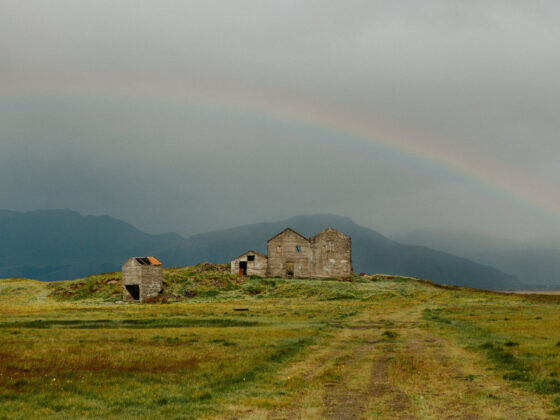How many of us have wrestled with deciphering God’s will for our lives? It’s typically well-intentioned; we want to be sure that the step we’re taking aligns with God’s will. But it’s easy to overthink and over complicate God’s will.
A couple of years ago, I re-read Prince Caspian by C. S. Lewis. Lewis masterfully employs allegory to represent Jesus in the character of Aslan, a fearsome yet compassionate lion. Aslan guides and aids the characters on their physical journey, but he also provides hope, courage and moral counsel. There’s one scene, where Aslan tells Lucy (another main character) that she made a mistake, and should have followed him even when no one else saw him.
Now, I’m as big a fan of C.S. Lewis as the next Christian raised on The Chronicles of Narnia series—and I think I misunderstood Lewis’ intentions—but this scene haunted me for months. Suddenly every decision was accompanied by the crippling, overwhelming fear that I was going to make the wrong choice. I imagined God sighing up in heaven as I failed to discern the clues he had given me.
But the God of the Bible is not like the Greek deities, taking pleasure in deceiving humans and entertained by their failures. God loves his creation (Genesis 1:31), and because he loves us, we can be confident that his intentions for us are good (Romans 8:28). God has revealed some things to us, but there are many things which remain a mystery (Deuteronomy 29:29). We know why Jesus came to earth, and with twenty-first century eyes we are able to trace the salvation story through the Bible. But we still struggle to make sense of suffering, and honestly I’m not convinced anyone really understands the concept of predestination—the idea that before the world began, God planned out everything that would ever happen. As the apostle Paul said, now we understand only in part, but when we are bodily reunited with Jesus, these things will become clear (1 Corinthians 13:12, NCV). In the same way, we must be able to yield our futures to God in trust, believing that his plans—though not always clear to us—are for our good and his glory.
The psalmist describes God’s Word as “a lamp to my feet and a light to my path,” (Psalm 119:105, ESV). The Bible illuminates the path at our feet. God doesn’t promise us a floodlight, or a bird’s eye view of our lives, but wisdom for the choice before us. God’s Word teaches us how to live by his precepts, and the Holy Spirit guides and convicts us. This is what we’re given—and therefore it’s all we need.
The Bible doesn’t give us detailed instructions for every possible situation we might find ourselves in. It doesn’t tell us which degree to study or where to live. That’s comforting—it means that in the grand scheme of things, college majors and house purchases, while significant, are not the ultimate purpose of life. The Bible tells us to love God and to love our neighbors, and it shows us what a life guided by those two values looks like. That’s what matters.
There’s a danger of romanticizing, or even glorifying the notion of having a “calling” for your life. We can get so caught up in needing to live for a noble purpose, that we forget who we are living for. Though we still require discernment in our daily choices, God’s ultimate will for us is crystal clear.
Jen Wilkin sums it up in her compelling book, In His Image: “What is God’s will for your life? Put simply, that you would be like Christ.”1 We don’t exactly know what God’s plan is for our lives. But we do know what we should do while we’re waiting.
The danger is not that we miss a secret sign from God, and are then abandoned to deal with the consequences of our unwitting blunder. The danger is that we become more consumed with ourselves than with God’s will.
God’s will is abundantly clear for us. We’re without excuse. Even in the in-between waiting rooms of life decisions, we still have the same instructions: to glorify God in everything we do (1 Corinthians 10:31). Every second of our lives, every breath that we take—in everything we should be guided by this same desire to glorify God.
We glorify God by living how he’s taught us; imitating his love, justice and holiness.
I often think about this comforting quote from Rich Villodas:2
“At the end of it all, Jesus will not say ‘well done good and successful servant,’ or ‘well done good and influential servant,’ or ‘well done good and high-capacity servant,’ but, ‘well done good and faithful servant.’ Success is being faithful to what God has called us to do.”
God calls us to be faithful. He’s not limited by our circumstances. He can work through us in seasons of poor and plenty, singleness, marriage, brokenness, joy, children or no children, house or flat, well-paying job or unemployment. Our different timelines present him different opportunities for glorification.
It’s easy to look back and wonder how our lives would look if we’d made different choices. And that’s true, our lives are in many ways the sum of small choices that could’ve gone differently. But that doesn’t mean we’ve somehow missed God’s calling. He’s working in the choices we’ve made and the places we’ve come through, bringing them together for good. So let us trust that we’re not “behind” or missing out, but that he has us where he wants us. We can be faithful right where we are.
Application questions to ask when making decisions:
- Which choice is more dynamic for God’s kingdom? Will I be partnering with God in establishing his kingdom here on earth?
- Does this glorify God’s character? Will others be able to see his character in this choice?
- What do the wise Christians in my life suggest? Are they at peace with this decision?
Footnotes:
1 Jen Wilkin, In His Image (Wheaton: Crossway, 2018), 16.
2 Rich Villodas, “Success is being faithful to what God has called us to do.” August 16, 2023, https://www.instagram.com/p/CwAl2ZXgPEd/?igsh=bzV6OTJnb3FsYWR0
Photo Credit: Emilee Carpenter
Corine loves Jesus, rocks, and books. She is a geologist by trade, and also enjoys writing a newsletter, Sunshine Theologians, where she shares what she’s learning in her faith journey. She lives in Ireland with her husband and the world's best cat.






